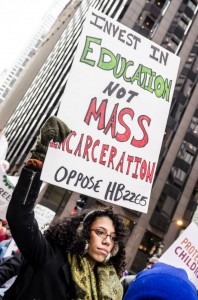
Prisons, Kittens and Climate Change: An Interview with Page May
By Elizabeth DuMont-McCaffrey
Page May is going to change the world if it’s the last thing she does. Whether we were discussing her work educating students about climate change or her prison activist book group’s reading list, passion poured from Page and inspired me 1,000 miles away throughout our phone conversation.
Directly after college, Page received the Bill Emerson National Hunger Fellowship, a prestigious fellowship that teaches budding activists about issues of hunger and poverty facing our country and places the fellows in non-profit organizations working to eradicate those problems. The fellowship sent Page to Washington, D.C (where she got to hang out with nuns all day) and Chicago (where she found love.)
Because of Debbie, Page’s girlfriend, Page decided to stay in Chicago after the end of the fellowship. It took time for Page to feel settled, but eventually she found a great community and adopted two stray cats, Charlie and Bazil. She began working for the Alliance for Climate Education in Chicago as the Education and Media Manager. At work, she mainly writes blogs, speaks at school assemblies and conducts trainings about the climate. She is thrilled to be working in a job that combines science, media and public speaking—just a few of her passions.
Speaking of passions, since graduating from MHC, Page has become a prison rights activist. After reading The New Jim Crow: Mass Incarceration in the Age of Colorblindness, Page was so inspired that she hosted a holiday party where attendees wrote holiday cards to LGBTQ prisoners. The holiday party was such a success that the group established a chapter of Black and Pink, an organization that supports LGBTQ prisoners. So far the group has been involved in protests, organized movie screenings and read many relevant books including Queer (In)Justice, Captive Genders, and Disrupting the School-to-Prison Pipeline. Assata, an autobiography by Assata Shakur, is next on the group’s list.
Another reason that Page founded this book group is because she missed the level of reading and learning she had at Mount Holyoke. She mentioned that at Mount Holyoke, political education was so normalized that she thought that was how life would be outside of college. However, it was hard to keep up with that same level of reading independently, so a politically-minded book group helped to form the same kind of community.
On a lighter note, Page also noted that she misses Mount Holyoke food. “I don’t cook so that sucks,” were her exact words on that subject.
I asked Page what she is hoping to do next and she replied that she wants to tear down the system. “We can’t go on this way,” she said.
